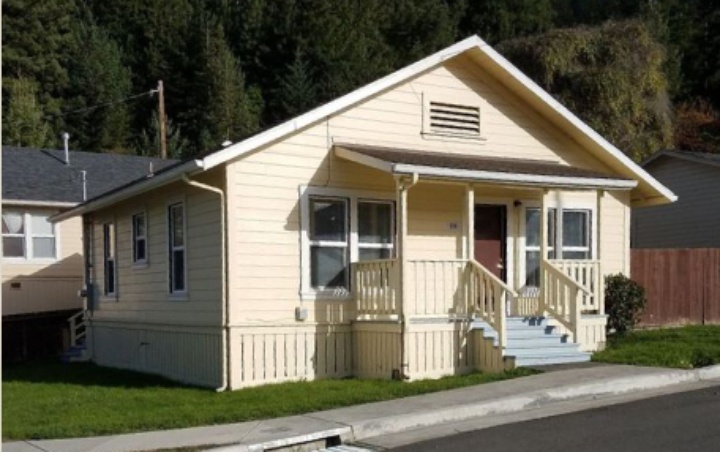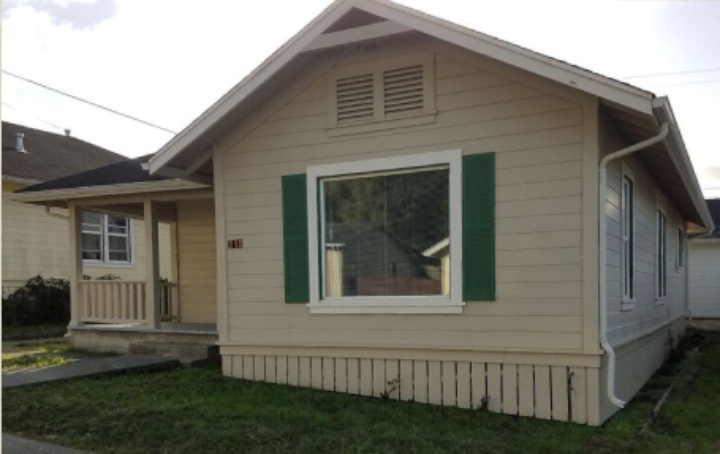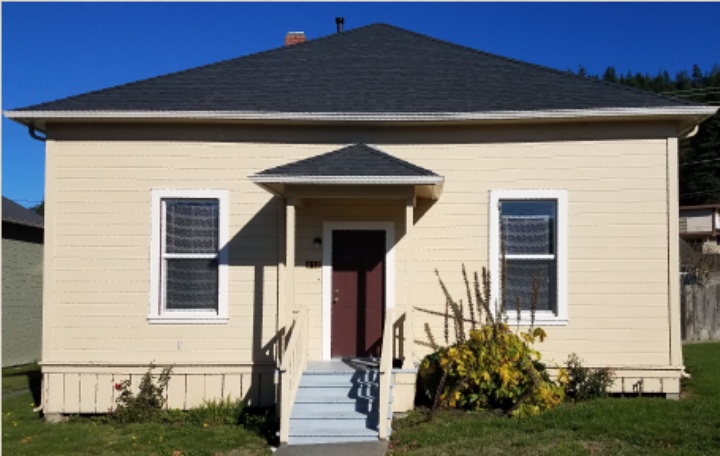
212 Mill Street. One of the “hot homes” listed on scotialiving.com, the website set up to move property in the former company town.
###
Today comes word that the final stage in transforming Scotia — one of the nation’s last operating company towns — is underway.
Three of the town’s 270 or so single-family homes are currently in escrow with private purchasers, according to the legal entity that has managed the properties since 2008, when the remains of the once-mighty Pacific Lumber Company — which owned and operated Scotia for more than 100 years — were parceled out in bankruptcy proceedings.
Since that time, Town of Scotia LLC — a holding firm set up by creditors to manage the town’s real estate — has been working with county government and other regulators in the enormously complicated process of subdividing the large parcels on which the town’s homes sit, and setting up a community services district to manage water, sewage, fire and recreational services for the new property owners.
A key milestone was reached yesterday, according to Town of Scotia — the Scotia Community Services District came to an agreement on future water and sewage rates. That trigger sent the first three home sales into escrow, with more to follow soon.
For most of its life, Scotia was occupied completely by employees of the Pacific Lumber Company, many of whom worked in the massive old-growth redwood sawmills on one edge of the town. Rents were low, and services were free. Its cogeneration plant burned the mills’ wood waste and delivered both electricity and radiator steam to every corner of the village.
Its halcyon days inevitably wound down when Pacific Lumber was acquired by the Texas-based junk bond king Charles Hurwitz in a hostile takeover in 1985. Hurwitz’s Maxxam Company promptly pilfered from the employees’ retirement plan, tripled the rate of cut and ransomed the Headwaters Forest to the state and federal government, extracting all the value it could out of its acquisition before it put the company out of its misery in bankruptcy court.
Pacific Lumber’s timber operations ended up in the hands of San Francisco’s Fisher family — scions of magnate Don Fisher, founder of The Gap and other clothing-based retail chains — who rebranded as the Humboldt Redwood Company. The town and other real estate assets ended up in the hands of a group headed by Marathon Capital, an investment bank that held some Maxxam debt. Marathon formed the “Town of Scotia” company to subdivide and sell off the Pacific Lumber homes. Which is where we are today.
Press release from Town of Scotia LLC:
The final step has begun in the process of private home ownership in the former company town of Scotia.
There are pending sales on three of the homes in Scotia and the property sales transactions have been placed in escrow. The escrow process is anticipated to close in 60 days. Several other Scotia properties will begin the escrow process in the coming weeks.
Additionally, the sale of two garage lots in Scotia is also in escrow.
Because the transactions have not been finalized, the names of the buyers, addresses of the homes, and the purchase prices will not be released.

213 Mill Street.
Several factors will influence the length of the escrow process. Two important preconditions to close of escrow relate to the Scotia Community Services District (SCSD):
Final sales require, first, that the SCSD have established its new utility rates for Water, Sewer and Storm Drainage services. These rates were established and adopted by the SCSD Board at its February 16, 2017 meeting after a noticed property owners’ ballot “election” in support. The rates will become effective shortly.
Second, the Town of Scotia (TOS) informed the Bureau of Real Estate that it will promptly complete the long planned dedication to the community, not only of the public utilities treatment plants, but also of several essential historic, civic and recreational community facilities. As a consequence, before close of any home sales, TOS plans to complete the transfer to SCSD of the much beloved Winema Theater, the Scotia Museum, Carpenter’s Field Ballpark, Fireman’s Park Picnic Area and the Scotia Soccer Field. That transfer should be concluded by April 1, 2017.

412 Church Street.
Phase one sales (which includes 39 houses) now underway are in the neighborhood called The Redwoods, which includes properties on Eddy, Mill, and Church Streets. Home sales will continue in phase one until all properties are sold.
Phase two of home sales in Scotia is expected to begin in September 2017. This neighborhood is called Eagle Crest and includes 71 homes and properties from 1st and B Streets, through 3rd Street.
Phase three home sales in Scotia, scheduled to begin in August of 2018, is in the neighborhood called Murphy’s Pointe. It includes 67 houses on B and Main Streets and 4th through 6th Streets.
Phase four and five are several years down the road, with sales anticipated to begin in August of 2019 and August 2020 respectively. The phase four neighborhood is called Salmon Run and includes 74 houses along Williams Street, and the phase five neighborhood is called The Depot, and includes 19 houses in the North Court area of Scotia. All dates are subject to change due to unforeseen factors.
The cost of the homes in Scotia is quite often the number one question that is asked. The answer is that there is no base-price, since no two homes in Scotia are the same, other than the bedroom and bathroom configuration.
Because of the many questions arising about the home sales in Scotia, a Frequently Asked Questions document has been developed to provide additional information. This information is available on the Scotia Living website (www.scotialiving.com) and copies may be found at the Scotia Living office at 108 Main Street.

CLICK TO MANAGE